Each year, on the evening of Dec. 21, I make myself a tea and peer out my second-floor bedroom window at the spectacle outside. I have an excellent view of the church across the lane where 50 or so people gather in the labyrinth, encircled by white Christmas lights. They’ve come to celebrate the winter solstice, the longest night of the year.
Leading them in song as they dance in a circle is the deacon of St. David and St. Paul Anglican Church, Ron Berezan. For the past 25 years, he has strummed his guitar at outdoor rituals like this in temperatures dipping to minus 30 degrees (in Edmonton) and in wet Pacific winds (where we live in Powell River, B.C.), helping people across the religious and secular spectrums connect with the season, the darkness and the promise of light’s return.
I don’t join them (the prospect of dancing in public gives me ulcers). But I am fascinated by what I’m seeing, because Christmas has lost its charms for me and my family. And I’m not sure why — or how to fix it.
“I don’t think we know what to do with Christmas anymore,” reflects Berezan, sitting in the basement of his church. “At the time I started celebrating solstice, my kids were still quite young, and I didn’t like Christmas. I was grouchy and irritable about the season. I was bitter about the consumerist orgy the holiday had become. And I was disappointed by the saccharine religious experience. I was Catholic at the time, and it just didn’t land with a lot of meaning for me.”
With his non-religious neighbours in Edmonton, Berezan began the solstice gathering as a social, buoyant antidote to the holidays. When he moved to the West Coast a decade ago, he continued celebrating winter (and summer) solstice in his home, adding deeper elements, such as prayers of lament for the Earth, a sacred fire and time for silent contemplation under the night sky. He and his wife invited friends, until it grew too big for their Arts and Crafts-era cottage, and they moved the annual event to the church garden.
Now, he fully celebrates both December holidays: winter solstice and Christmas, with its marathon rounds of Advent Sundays, lessons, carols and Christmas Eve services. “Living in a northern climate, there’s something about making that big turn around the sun at this time of year, and exploring the mystery of that — of witnessing the presence of the divine in all matter,” says Berezan. “Solstice helps me get there. Solstice helps me rescue the meaning of Christmas.”
Berezan is, of course, contemplative, theologically adept, community-centred and open-minded. With those skills, he’s been able to sift through the trough of holiday swill and grasp some meaning. But for many of us, Christmas can be a disappointing, depressing, expectation-heavy brouhaha resulting in financial and environmental disaster.
Tense. Busy. With the full force of the media behind them, the retail industry and religion bear down on us with edicts of hope, peace, love and joy. How do we make sense of it all? More importantly, how do we find any meaning?
As I was preparing to write this article, I asked a handful of people in my community if they like Christmas. In short, I didn’t find anyone who said, unreservedly, “yes.” Instead, I heard stories of misery and discontent. One family’s resentment when someone made a different-than-normal potato dish. A household that centres the holiday on preparing and consuming food even though everyone has eating disorders. A grandmother who can’t afford the presents her children and grandchildren expect. Even my own son, age 12 and theoretically at the height of his gift-consuming years, has asked to skip Christmas this year. It’s just too much, he says.
How did Christmas become such a dizzying cultural labyrinth that it takes a master theologian to guide us back to its centre? More importantly, how did our big mid-winter festival become so un-fun?

The answers, according to the author of Christmas: A Biography, are a matter of history. Judith Flanders is fascinated by Christmas. A non-observant Jew living in London, she started researching the holiday as a “way of looking at how history develops and how our beliefs about our own history develop.”
Indeed, Christmas is a holiday about belief — belief in what Christmas should be. And cultural leaders have been complaining that it’s too raucous, or too hedonistic, for at least 1,600 years. The first Christmas celebrations happened in about AD 340. Within just 40 years, the Archbishop of Constantinople was upset about the feasting and dancing associated with it.
Flanders says that the social origins of the mid-winter party are agrarian. By late December, subsistence farmers in Europe had finished harvesting their crops, brewed their beer and wine, and slaughtered and preserved all the animals they didn’t wish to keep over the winter. They had the time and treats for a good party. And party they did.
In her book, Flanders describes some over-the-top food: “One recipe for a Christmas pie from 1394 includes pheasant, hare, capon, partridge, pigeon and rabbit, livers, hearts and kidneys, and meatballs, all spiced and sauced and cooked with pickled mushrooms before being baked into a pastry case ‘made craftily in the likeness of a bird’s body’, including a ‘great tail’ complete with feathers.” (And we think Christmas cookies are a lot of work.) She also describes more recent wild gatherings: England’s famous mumming and Newfoundland’s janneying involved adults in disguise visiting their neighbours to dance or share food and booze.
Before the late 1800s, Christmas was an adult party of overconsumption and debauchery. The Victorians, enchanted with the innocence of the young, introduced the idea of a family-centred Christmas. That’s when the expectations of magic and consumerism were added to the grand bender. It’s also when people partied less with neighbours and started to turn inward, to their nuclear families.
“The dynamics we have with our neighbours and communities are very different than those we have with our families,” says Flanders. “With the rise of the press and increased literacy, the stories in newspapers, magazines and books about beautiful family Christmases put pressure on people.…So there’s this double push-pull happening: this is what we should have, and this is what we fail to have.”
In other words, the problem with Christmas is expecting it to be something it’s not: sacred, pleasant or private. “It is simply not the case that the religious elements we associate with Christmas have ever been the core of what the holiday is about,” says Flanders. “It is a winter holiday. People say, ‘Oh hell. It’s dark, cold and miserable, let’s kick up our heels.’”
Disagreeing heartily with this secularist conclusion is historian Gerry Bowler. He’s the author of Christmas in the Crosshairs: Two Thousand Years of Denouncing and Defending the World’s Most Celebrated Holiday. Christmas at its best, theorizes Bowler, is a tug of war between a good party and celebrating the Incarnation — God becoming flesh in the birth of Jesus.
We spend, we eat, we decorate, we give, we watch movies and we sit on a pew. And some of these we do to the point of unhealthy excess.
“She’s wrong,” says Bowler, a practising Anglican who grew up in the United Church. “When the balance is right, it’s magic. When religion is taken out, it’s just another New Year’s Eve. When religion predominates, as when the Calvinists cracked down on celebrations, then you have sterility. There’s no joy. When we get it right — combining the supernatural and family-centred celebration, combining charity with merriment — then you have this wonderful occasion that has spread all around the world.”
And this is where we seem to struggle — finding and creating some balance. Instead, we just heap more and more on our festive plates. Generally, we do six major things for the holidays: we spend, we eat, we decorate, we give, we watch movies and we sit on a pew. And some of these we do to the point of unhealthy excess.
Canadian adults spent an average of $705 on Christmas in 2017, according to the Retail Council of Canada (RCC) (an amount that doesn’t help with our colossal debt stress). This amount includes food and alcohol for entertaining, gifts and decorations. It’s easy to feel our holiday spending is out of control.
And it’s not like we’re having fun while we’re shopping. The RCC’s survey reveals that more than half of us report “holiday shopping is stressful” and “finding the right gifts is a challenge.” Less than half of us “shop in-store because it’s more social and festive” or “enjoy holiday shopping more than other times of the year.” Despite this emotional and economic misery under fluorescent lights, Canadian holiday retail grew about 3.5 percent in 2018.
Another area where we tend to go overboard is holiday decorating. But what are we saying with all those LED lights, sparkly tinsel and inflatable Santas? Philadelphia-based writer Sarah Archer is the author of Midcentury Christmas: Holiday Fads, Fancies, and Fun from 1945 to 1970 and she says that if you want to understand the complexities of an era, look at its ornaments. Decorations reflect how we think and can sometimes reveal our anxieties, she explains. North America in the 1950s, for example, got space-age Santas and Sputnik stars to upend fears about the Cold War. Now, some of our decor uses nature imagery — owls, birch bark, boughs — because we’re conflicted about digital technology and terrified for the environment. “There’s a hunger for optimism,” she says.
For many, the search for optimism takes us out of our overly decorated homes and into the movie theatres in December. For studios, Christmas is a sure-fire box office win, thanks to our loose wallets and time off. Audiences show up looking for big feelings: magic (It’s a Wonderful Life, 1946); nostalgia (A Christmas Story, 1983); entertainment (Die Hard, 1988); laughter (National Lampoon’s Christmas Vacation, 1989); belonging (Elf, 2003); and abs (Aquaman, 2018). A dark theatre is also a great place to forget about all the holiday-induced stress for a couple of hours.
More on Broadview: What I listen to instead of Christmas music
When we’re not spending money on gifts or ourselves, Canadians like to give to charity during the Christmas season. In fact, almost one third of all donations happen in the last month of the year (hello, good tidings and tax receipts). On average, we each give over $100 around Christmas through charitable fundraising campaigns.
We also place our offerings in church collection plates over the holidays when normally half-filled pews are packed end-to-end with families. In the 1940s, more than half of Canadians attended a worship service weekly. By 2013, only 13 percent went regularly. Of course, many more show up for the holidays — close to 50 percent.
Why do we spend, eat, give, decorate, watch movies and go to church? Perhaps we’re just trying to meet expectations. Or maybe, like the generations before us, we’re searching for meaning and merriment in the darkness of our mid-winter.
Perhaps no one on Earth has thought more thoroughly about the meaning of Christmas than Adam C. English, a professor of Christian theology and philosophy at Campbell University in North Carolina. A decade ago, he was obsessed with the early church and found himself at the grave of St. Nicholas in Bari, Italy, wondering about the saint with the most secular devotees worldwide. That visit became his book The Saint Who Would Be Santa Claus: The True Life and Trials of Nicholas of Myra. Further reflection led to his second book on the holiday, Christmas: Theological Anticipations.
In his own life, English leans in to the season’s complexities, eking meaning out of the mess. “Those of us who have since our youth breathed the air of postmodernity… acquired a taste for the bric-a-brac Christmas with its family meals, crass sweaters, and inflatable snowmen in the yard,” he writes in Christmas. “[T]he holidays have a way of summoning the bonkers and the beautiful, the neon blitz of the shopping mall and the gentle wonder of midnight Mass.”
Within the church, he says, Christmas can get lost under a layer of saccharine or dismissed as being less theologically important than Easter. As Christians, the meaning of Christmas should be kept crystal clear. “It’s momentous that God sets aside the crown and throne and steps down and identifies with us, with all our human failings,” he says, pointing out that this is the very centre of the Christian faith. “We should want to celebrate the incarnational moment.”
So what might that celebration look like, in a way that is not overly sentimental or too secular? English says that his favourite contemporary Christmas services are simple — and dark. “In just candlelight, scriptures are read that talk about the prophetic anticipation of the Incarnation, and the service will culminate in the lighting of the Christmas tree,” he says. “It could feel cheesy or commercialist, but you have a real visceral representation of what is being communicated — here is the light of the world.”
But Christmas, advises English, is also for reflecting on the meaning of the Incarnation, thinking critically about the relevance of the Nativity story in our lives today, and acting on issues of social justice. “You can have a faith-self that’s sombre and a family-self that’s jolly, but we’ve got to link those,” he says. “That’s the challenge of Christmas: to find ways to link family and tradition with this high and holy day.”
“The holidays have a way of summoning the bonkers and the beautiful, the neon blitz of the shopping mall and the gentle wonder of midnight mass.”
Adam C. English
To Ron Berezan, the Anglican deacon who offers solstice ceremonies in his church garden, a religious Christmas has never been more crucial for himself — but also for many others living through this overwhelming, soul-crushing season. Solstice participation continues to grow every year, he says, because there’s a hunger for connection and for ritual, and also a hunger to face the darkness we’ve created for ourselves.
“The reality is we’re living in a time of great loss,” he says. “Going right to ‘hope’ is cheap. We can’t have our eyes and hearts open to what’s happening in the world — the species loss, climate change — and navigate that alone. We need to have that grief honoured in ritual places. There’s something vital about allowing ourselves to take that journey.”
The Christmas story, too, is about darkness. Herod had it in for Jesus. The holy family escaped to Egypt, avoiding the slaughter of baby boys. Those were scary, violent times (like ours). But here’s the tension: it’s also about light in the darkness. The Incarnation. Transformation.
So what am I supposed to do when life is dark and scary? Sit solemnly in a pew? Eat turkey with my husband and overstimulated, fighting preteens? Max out my Visa? Maybe. To fully grapple with the darkness and anticipate the light of the world, maybe I should make like my European ancestors and party with my neighbours. It won’t solve our environmental or political problems, but celebrating isn’t about solutions. Celebrating, I’ve come to understand, is about transforming our inner lives and our relationships to other people, ultimately to make way for a better world. It’s about rejoicing. Rejoice! Isn’t that the actual instruction?
I’m really good at feeling miserable and cynical. Joy often eludes me, especially at Christmas. Lamenting species loss, sneering at container shipping — this is my area of expertise. What I fail at is leaning into hope, wondering at hope, making way for hope.
I’d love to end this piece by revealing that this Christmas, or solstice, I’ll dance freely in the church labyrinth across the way. I probably won’t. But I will try to participate less-guiltily in our 21st-century version of the brouhaha — buying gifts, revelling in glitzy ornaments, eating too many Dollarama brandy beans. I am in as much need of a mid-winter blowout as anyone else across time and geography.
I will, however, change how I think and feel about these celebrations: not as an aberration from a perfectly holy past, but as a complicated month-long event abundant in tensions and contradictions and inspirations. I have faith that in the whirlwind of the LED lights, family dinners, Nativity plays and labyrinths, there’s a spark.
This story first appeared in Broadview‘s December 2019 issue with the title “Under pressure.”
Broadview is an award-winning progressive Christian magazine, featuring stories about spirituality, justice and ethical living. For more of our content, subscribe to the magazine today.

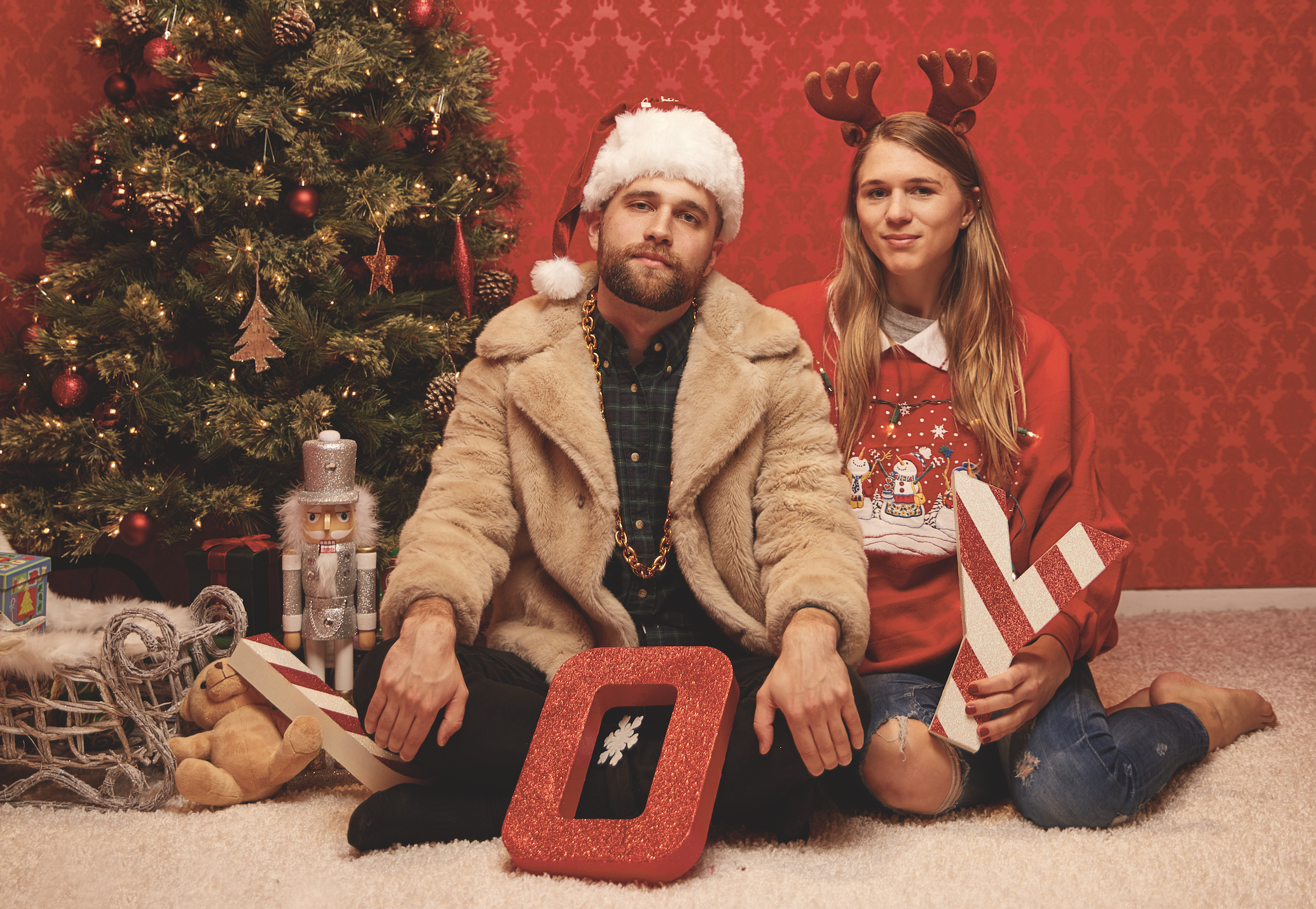









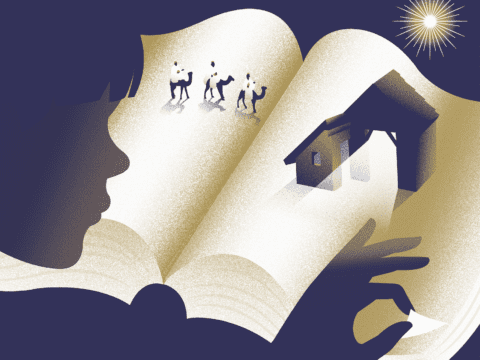
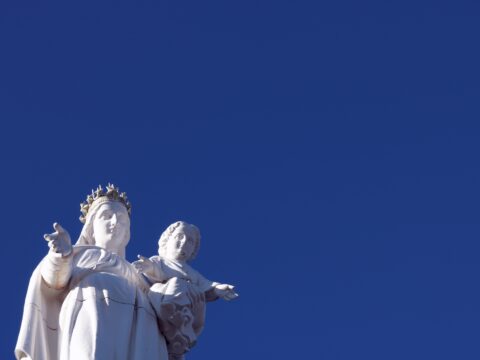
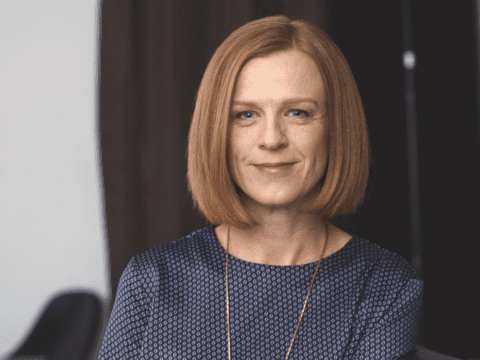
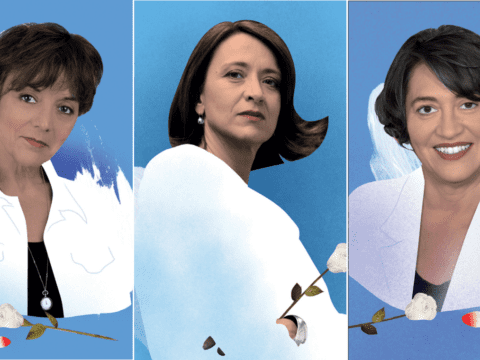

Christmas is summed up in Luke 2:13-14
Suddenly a great company of the heavenly host appeared with the angel, praising God and saying,
“Glory to God in the highest heaven,
and on earth peace to those on whom his favor rests.”
The angels were so excited for man-kind and with God’s grace and mercy towards us, they had to tell someone about what just took place. They couldn’t contain themselves. The only people available to share with were shepherds. I often wonder who else was awake at that time, and willing to care what was happening.
Note who received the glory, not us, but God. And note who receives peace with God, not everyone. Only those who has God’s favour resting on them. (I find this a tough saying)
Anything else that we call Christmas is just selfishness on our part.
What is your deepest longing about Christmas? I am not sure you made that clear in the article. Do you prefer darkness or light? In the Christmas gospel Gods deepest longing is that you go to the manger with the shepherds and gaze upon the baby Jesus. See in his smile, the fullness of God face smiling at you. See in his tiny hands reaching toward you, God’s love desiring to hold you. Christmas (like Easter) is nothing about what we do for God. It is a time to consider what God’s love is doing for us. I don’t know what specific congregations or denominations do Christmas but if we are part of “the universal church” we invite the world and everyone in it to encounter God with us in Jesus.
For me, the idea of Christmas is the Christos being revealed within our humanity. God lives within us and the journey we travel should reveal more and more of our divine nature. However, as far as the secular part goes, I realized some years ago that at this time of year I gave my brother a $50.00 gift card and he gave me one in return so our gifts cancelled each other out. This year my sister-in-law is in a personal care home with dementia. Not a good Christmas for my brother. I realize that gifts cost too much and we really don’t know anyone well enough to know what they would really like as a gift and besides, with online shopping and unlimited credit, people simply get what they want when they want it. In my ministry I’ve see people get angry over things they didn’t get in their free food hampers. I’ve seen churches filled with people I’d not seen before. I’ve seen too many drunk people and the aftermath of their drunkenness and at age 70 my partner and I have come to the point where we celebrate God within us and around us every day. We don’t need a special time of year to be grateful or loving or caring. The journey with God is a daily and lifelong event. We have all we need and we live in a daily relationship with God. Oh we do send out cards and we have a few lights around but we gave our tree to the Goodwill Centre a couple of years ago and our family is scattered so we have just the two of us and we are happier than the early years when everything was a mad scramble. It takes a while to learn that God lives within man (humanity) and not “A” man. There’s quite a difference.